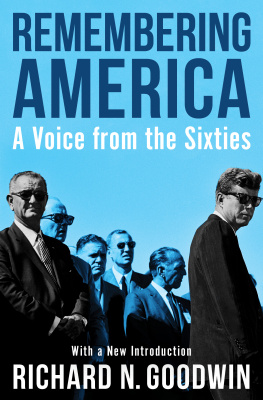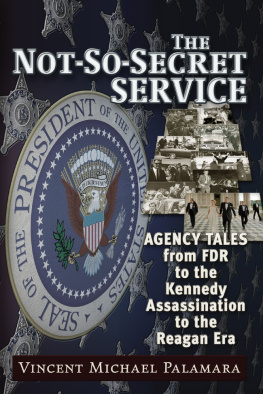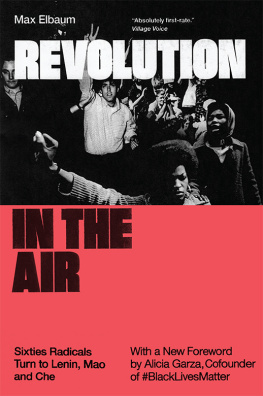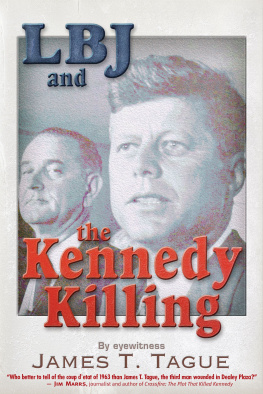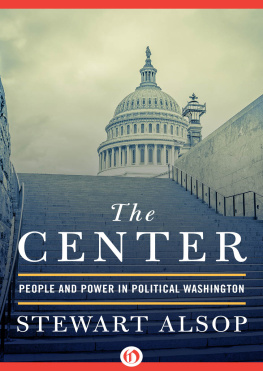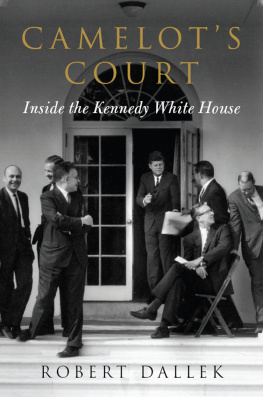Remembering America
A Voice from the Sixties
Richard Goodwin

1 / Beginnings
S HINING BLACK CRYSTALS scattered along the sun-scorched stone. I had never seen, nor imagined, the abundance of black bodies that I saw when, aged ten years, I emerged from Washingtons Union Station poised beneath the marble structures from which the country was governed.
Accompanied by my mother and younger brother, I had made the ten-hour train trip from our native Boston to join my father, who had come to work for the Maritime Commission a few months before the Japanese attack on Pearl Harbor. A trained engineer, he found his job had disappeared during the depression. He was forced to make his living as an insurance salesman until the godlike Roosevelt had need of men with his skills in the frantic effort to prepare the country for war. Until then, we had lived in a small apartment in a lower-income working-class section of Boston. One rarely saw a black face. The small black population of Boston lived somewhere else; distant from that world, bounded by a few dozen blocks of streets and apartment buildings, from which I was taken on occasional automobile trips to the countryside my uncles place on the lake at Wrentham, or Hoods farm, where one could watch real cows being milked.
A few months after my fathers departure, an aunt interrupted my tenth birthday party. The Japanese had just attacked Pearl Harbor. I barely noticed the swift dissolution of my celebration, feeling a thrill of excitement, an exultation of awareness that great events had happened. And on my birthday. On Dick Goodwins day. Ignoring my departing friends I rushed to the radio, listened to the confused tumble of announcements, took several pieces of paper, and penciled the news of the attack across the top of a dozen sheets. I ran down the street to the corner drugstore and offered my homemade broadsheet to passing motorists at the outrageous price of five cents a copy, selling out quickly for enough money to buy six comic books.
I had, for the first time, turned my engagement with language into profit. I could, my mother told me, talk before I could walk; had taught myself, with her help, to read before entering the first grade. By the time of this tenth birthday I was reading the works of James Fenimore Cooper and Mark Twain. I read at the table, propped books on the sink while brushing my teeth. Books, those fabulous frigates, were not only an escape from more unpleasant aspects of my life, but a source of delight, of pleasurable fulfillment. Perhaps my closest moments with my father, who loved and cherished books, were our walks together to the local public library, which contained a miraculous, unbounded store of tales and adventures. He would accompany me through the shelves, never interfering with my choices, and together we would return home where, stimulated by this tacit paternal blessing, I would turn eagerly from one work to another, embarked although I did not know it then on a lifelong love affair with language, its content, and the rhythmically cadenced interior sounds of words themselves. It was natural for me to react to Pearl Harbor by translating experience into headlines and sentences. I had already begun to think of words as the world made manifest.
I soon understood, or was told, that a terrible thing had happened. We were at war. But that reality was an abstraction compared to the fact that my fathers job was secure at least for the duration. And we were going to Washington, a city whose only known location was in pictures illustrating a few grammar school texts.
Perhaps it was because those photographs had only been accompanied by portraits of grave, dead, famous men, that half expecting to encounter Abraham Lincoln I was struck so forcibly by the sight of so many black faces. The sight had no large meaning, aroused no private emotion except astonishment at this first encounter with the wonders of a new world.
The very next day I walked from our new flat in a housing project in now-suburban, then rural, Maryland, to a small creek. Glimpsing a large turtle idling through the slow currents, I rushed home to tell my parents astounding news. I had witnessed, for the first time, a live animal in its natural surroundings.
Toward the blacks as toward the turtle, I felt no sense of apartness except for that part of me which was slowly maturing to a solitary identity, severing me from the universe. Blacks existed. They had been perceived and incorporated by my expanding interior imagination of the world. Later, while attending a segregated school in Washington, when I heard others parrot the catechisms of racial hostility they had picked up at the family table, it meant nothing to me. They were only fashionable expletives like damn, or hell, or shit which had no consequences for the real world of a ten-year-old.
There were, as I realized much later, other experiences that formed my attitudes toward the racial battles that were to dominate much of public life in the 1960s. Having grown up in a largely Jewish neighborhood in Boston, the anti-Semitism of Maryland came as a puzzling surprise, soon displaced by fear and, ultimately, defiance. I was frequently harassed and taunted Jew Boy, kike and occasionally beaten up by older boys.
Among my circle of friends, members of a neighborhood club we named the Terrible Turtles, there was a boy named Fuzzy Hayes. Bigger than I and stronger, he would occasionally use anti-Semitic phrases in my presence. But he was careful not to press his hostile gibes, and I was afraid of him. One day, when the fresh-laid sod of the housing development was still soaked with spring rains, Fuzzy and two of my friends took a ball from my younger brother. They began to throw it to each other, challenging me to recover it. It was only a game. The ball was caught by Fuzzy, who held it as I ran toward him, but, instead of relaying it, he held on and shouted as I approached, Come get it, Jew Boy. Something in my brain exploded, the entire world was drowned by a torrent of darkening blood. I remember nothing that happened until, a few moments later, some of my friends were pulling me away from Fuzzy Hayes, who lay on the ground, struggling as I held his face in the strangling mud. He was suffocating. And for many years perhaps even now my only regret was that I had not killed him.
From that day forward Fuzzy never said an offending word to me. My fear of him was gone. And I noticed that when a group of us walked together, he kept some distance from me, slightly out of reach. I even felt an occasional twinge of affection, quickly suppressed, toward a boy who had managed to make me feel so good about myself.
For almost the first time, the world not my parents or teachers had taught me a moral lesson. I did not learn not to be afraid, for I have experienced many moments of fear, far more intense and more firmly grounded in reality. But there is a time when one must yield forever, or hurl oneself at the source, without calculation of probabilities. And in later years when, on television, I watched the bodies of protesting blacks battered by the firehose in the hands of a Birmingham sheriff or club-wielding policemen, I often imagined I saw in their expression of rage the face of Fuzzy Hayes.
In August of 1945, as I sat quietly reading in our apartment, an elongated spherical casing tumbled from a solitary plane toward tranquil, unsuspecting Hiroshima, and the world shuddered. Hearing the news on the radio, I rushed to the kitchen. Mom, theyve dropped some kind of superbomb on the Japs. The radio says the war is probably over. Does that mean well be going back to Boston? For me, the atomic age meant just that. We moved to Brookline where I completed high school, and then went to Tufts University in Medford, where my performance earned me a full scholarship to Harvard Law School.

